The Ghost Sonata (33 page)
Authors: JENNIFER ALLISON

“Yeah, they probably are.”
“And I don't âstick' with people, either. I drop people like hot potatoes, right and left.”
“You've had the same best friend for years.”
“That's a
good
thing.”
good
thing.”
“Okay. But what about all of this stuff about trying to talk to dead people? Isn't that just a way of not being able to let go of someone who's not here anymore?”
Now Gilda was completely offended. “Listen, Stephen, I'm not chasing dead people around because I'm âclingy.' They're the ones who talk to
me
!”
me
!”
“Forget I said anything.”
“I will.”
“Gilda . . . I just don't want you to get hurt, okay?”
“Oh.” This comment surprised Gilda. “Okay.” She rarely encountered a protective streak in her older brother. “Don't worry,” she said. “I'm as tough as they come.”
As she hung up the phone, she had to admit she felt a little better after talking to Stephen.
Maybe by the time I get home and sit down in the kitchen to eat a Pop-Tart and tell Mom and Stephen about my adventures, Julian won't matter to me anymore
, Gilda told herself.
Maybe by the time I get home and sit down in the kitchen to eat a Pop-Tart and tell Mom and Stephen about my adventures, Julian won't matter to me anymore
, Gilda told herself.
Â
As she made her way back through the square, which was now almost completely empty, Gilda thought about what Stephen had said.
Am I really “clingy”?
she wondered. It was an insulting, diminishing word that in no way reflected how Gilda saw herselfâbrilliant, sultry, rough-edgedâa psychic detective who managed to combine high fashion with the hard-boiled demeanor of a seasoned police officer. Hadn't she proven that she wasn't afraid of ghosts, foreign travel, or performing in front of live audiences? Surely she wasn't the type of fragile girl who could be so easily “hurt” by the silly whims of a boy.
Am I really “clingy”?
she wondered. It was an insulting, diminishing word that in no way reflected how Gilda saw herselfâbrilliant, sultry, rough-edgedâa psychic detective who managed to combine high fashion with the hard-boiled demeanor of a seasoned police officer. Hadn't she proven that she wasn't afraid of ghosts, foreign travel, or performing in front of live audiences? Surely she wasn't the type of fragile girl who could be so easily “hurt” by the silly whims of a boy.
On the other hand, she couldn't help thinking there might be a kernel of truth to Stephen's point. What if there was something about losing her dad that made her want to hang on to certain peopleâeven people who had already disappeared forever?
But why is that such a bad thing?
Gilda wondered.
Why does it always seem that people are supposed to care about each other less?
Gilda wondered.
Why does it always seem that people are supposed to care about each other less?
As Gilda considered these questions, she noticed a boy walking through Gloucester Greenâa stranger who seemed somehow familiar. He wore a long, black overcoat and carried what looked like a term paper or manuscript rolled up as if it were a diploma or an antique scroll. He walked through the silent square whistling a somber tuneâa melody that also sounded like something she had heard before.
The boy disappeared around the corner onto the High Street, and Gilda decided to follow him.
But when Gilda rounded the corner, the boy had vanished. Standing on the empty street lined with streetlamps and shops that had closed for the evening, Gilda felt a cold, tingling sensation. She remembered reading about “walking ghosts” in her
Psychic's Handbook
âghosts that materialize to walk a certain path and then vanish just as an onlooker approaches to speak to them.
Psychic's Handbook
âghosts that materialize to walk a certain path and then vanish just as an onlooker approaches to speak to them.
Gilda remembered the apparition she saw on her first night at Wyntle House.
I feel like I just saw a ghost again
, she thought.
I feel like I just saw a ghost again
, she thought.
45

The Last Sign
Â
Wendy stayed in her practice room until after nightfall, memorizing the structure of the Sonata in A Minor. The composition was more complex than the simple melody she had heard in her mind, but she loved the way a single familiar voice wandered through the entire piece, sometimes inverted and interwoven with countermelodies as in a fugue.
Something had changed, because Wendy no longer felt scared. Instead, she felt excited, as if she had a special secretâa secret kept between herself and somebody nobody else could see.
I've never really had any interesting secrets of my own
, Wendy thought.
My parents always know where I am. I always practice the piano and do my homework. I've always tried to perform my music exactly the way Mrs. Mendelovich wants me to play it. And what do I get in return? I get to feel like I'm a good personâa dutiful daughter who's grateful for everything her parents have sacrificed.
, Wendy thought.
My parents always know where I am. I always practice the piano and do my homework. I've always tried to perform my music exactly the way Mrs. Mendelovich wants me to play it. And what do I get in return? I get to feel like I'm a good personâa dutiful daughter who's grateful for everything her parents have sacrificed.
Wendy still
wanted
to please her parents, but for the first time in her life, she sensed a different calling. When she played the Sonata in A Minor, she felt like a true artistâ someone who was making her own choices, someone who felt compelled to play music for its own sake.
wanted
to please her parents, but for the first time in her life, she sensed a different calling. When she played the Sonata in A Minor, she felt like a true artistâ someone who was making her own choices, someone who felt compelled to play music for its own sake.
As Wendy played through the composition, an idea was taking shape in her mindâa rebellious, impetuous idea that Mrs. Mendelovich, her parents, and quite possibly the judges would not like.
I've always been afraid of disappointing other people
, Wendy thought.
I'm done being afraid.
, Wendy thought.
I'm done being afraid.
It was late, and Wendy knew she would have to head back to Wyntle House in the dark. She turned off the light and shut the door to her practice room just in time to see Ming Fong leaving her practice room at exactly the same moment. Wendy knew the two of them should walk back to Wyntle House together, but she simply didn't want to face Ming Fong's competitive questions and comments:
“Do you feel ready?” “How long did you practice today?” “What did Mrs. Mendelovich say at your last lesson? She told me I have a chance of winning!” “Don't worry; I know you' ll be perfect next time, Wendy. Not like your first performance. . . .”
Wendy slipped down the hallway before Ming Fong noticed her, deciding to walk in the opposite direction instead.
“Do you feel ready?” “How long did you practice today?” “What did Mrs. Mendelovich say at your last lesson? She told me I have a chance of winning!” “Don't worry; I know you' ll be perfect next time, Wendy. Not like your first performance. . . .”
Wendy slipped down the hallway before Ming Fong noticed her, deciding to walk in the opposite direction instead.
Â
Wendy walked past Christ Church College in the moonlight and decided to take a shortcut down Dead Man's Walk. She shivered in the damp fog, walking as quickly as she could. When she reached the Merton College Chapel, she heard the faint, ethereal sound of a boys' choir accompanying an evensong service. Then she heard something that made her heart beat fasterâthe lonely sound of footsteps walking a short distance behind.
Someone's following me
, she thought.
Someone's following me
, she thought.
A familiar icy sensation crept under Wendy's skin and into her bones; it seemed she had wandered into an unpleasantly familiar dream.
You're not afraid anymore
, Wendy reminded herself. She took a deep breath and turned to glance behind her. The footsteps immediately stopped.
, Wendy reminded herself. She took a deep breath and turned to glance behind her. The footsteps immediately stopped.
It was hard to see clearly in the foggy darkness, but Wendy glimpsed what appeared to be the shadowy figure of a young man wearing a dark coat. He slipped through a gate in the college wall.
See?
Wendy told herself.
It was just a college student.
Wendy told herself.
It was just a college student.
Nevertheless, Wendy walked at an even brisker pace as she made her way back to the guesthouse.
Â
Wendy entered the dim, yellowish light of Wyntle House with a feeling of relief. She heard the television blaring from inside Mrs. Luard's room. As she climbed the creaking staircase leading to the second floor, she heard a mother reprimanding her young son from inside a guest room: “Stop hitting him, Sam!”
“But he loiks it, Mum!” the little boy replied.
On the next floor, she overheard Jenny Pickles arguing with her mother about an evening gown that was “too pink!”
Maybe I have time for a little catnap before dinner
, Wendy told herself. But when she opened the door to her room, she discovered something waiting for her. A tarot card lay on the mauve carpeting like an ominous little stain.
, Wendy told herself. But when she opened the door to her room, she discovered something waiting for her. A tarot card lay on the mauve carpeting like an ominous little stain.
The picture on the card showed a faceless figure wearing a dark cloakâa creature with heavy wings and a long, sharp scythe. A thin trail of blood trickled from the edge of its cloak.
At the bottom of the card, the word DEATH was printed in large letters.
46

Art and War
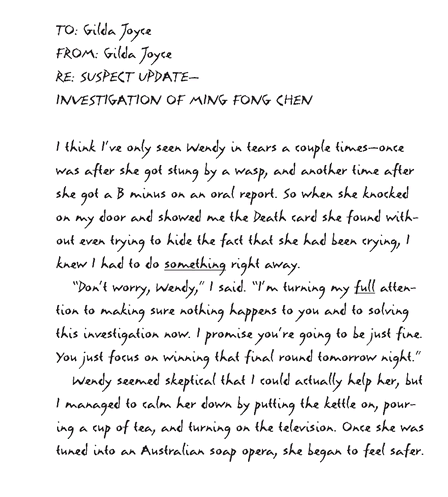
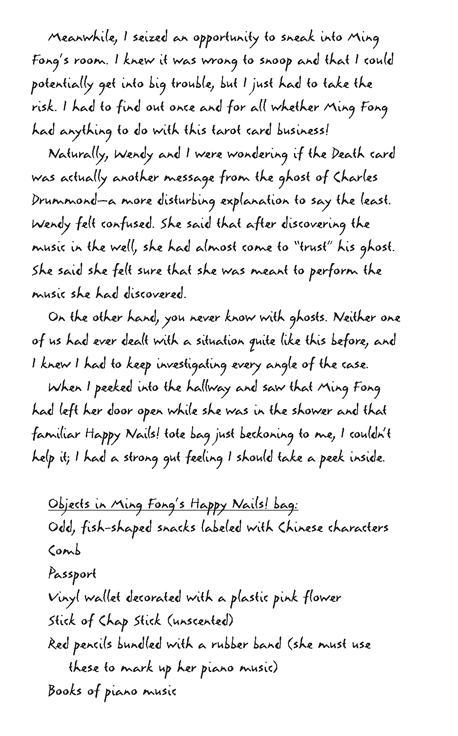
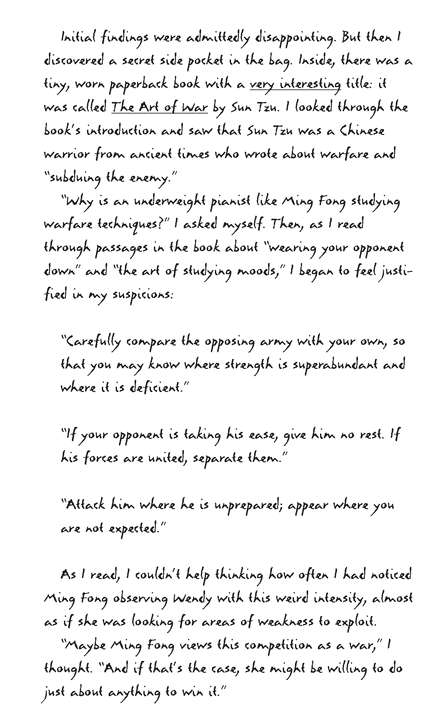
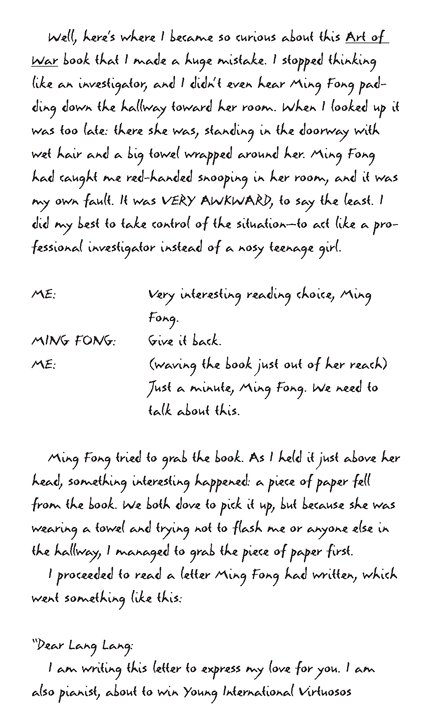
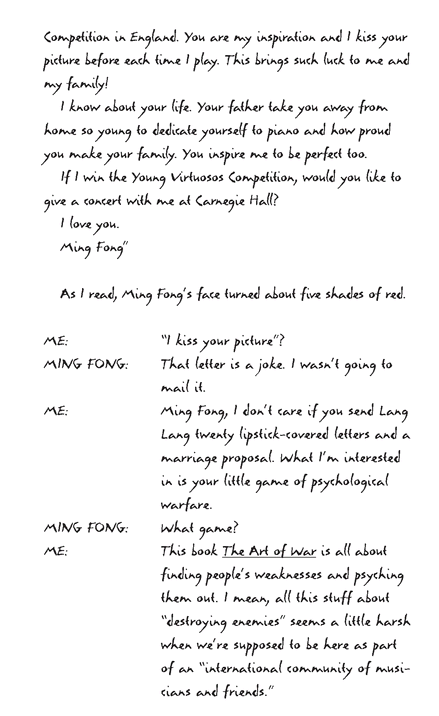
Other books
Relapse (Doctor Dom Volume 4) (A BDSM & Medical Play Novella) by Tara Crescent
Once a Killer by Martin Bodenham
Love Her Madly by M. Elizabeth Lee
Every Good Boy Deserves Favor and Professional Foul by Tom Stoppard
Interior Motives by Ginny Aiken
Alphas Unleashed 4 by Cora Wolf
Scene of Crime by Jill McGown
Long Way Home by Neve Cottrell
We Put the Baby in Sitter 2 by Cassandra Zara
The Miracle Inspector by Helen Smith
